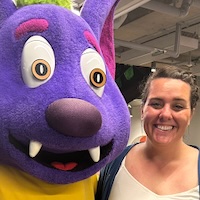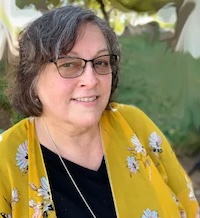Save the Date
Thursday, Nov. 6, – Friday, Nov. 7
Virtual | 9 a.m.-3 p.m
Join us for ACC’s Virtual Distance Education Symposium: “Designing for Everyone: Course Access and Student Success” during National Distance Learning Week!
Connect with fellow ACC educators and staff, share innovative ideas, and explore creative ways to design for access, inclusivity, and student success. Don’t miss this chance to be inspired and celebrate the future of online learning at ACC!
Friday Discussion Panel | 11 a.m.-Noon
Discussion Panel Topic: Empowering Every Learner: The Future of UDL and Accessibility

Dr. Elizabeth Knight, Associate Vice Chancellor for Academic Programs

Dr. Alex Watkins, Assistant Professor/Program Coordinator, Technical Communications

Michelle Escudier, Instructional Designer, Office of Distance and Alternative Education

Chinwendu Okoronkwo Burns, South Regional Director for Access & Disability Support
Friday Virtual Sessions | Nov. 7
Professional Development: one hour for each session attended . Each tab includes a session description.
Session 1 | 10 a.m.-10:50 a.m.
Session 1.1 | Presented by: Jared Chumsae
Pathways to Success: Maximizing Student Success By Offering Assessment Choices
Is it enough to differentiate instruction or course content if our assessment methods aren’t also differentiated? Last year, I began incorporating student choice strategies into my courses and have seen measurable success. I allow students to choose to take traditional quizzes / exams OR submit research projects. This gives students options in how they choose to demonstrate their learning. Student engagement, success rates, and overall satisfaction rates are all up in my courses.
Session 1.2 | Presented by: Jon-Mikel Pearson
How to Cheat with AI: Smarter Course Design through Vibe-Coding and HTML
Designing engaging courses in Blackboard can feel overwhelming, especially for faculty who are not professional coders or who are new to ACC or an LMS. Too often, course materials become static PowerPoints or walls of black text on white backgrounds, leaving students unmotivated and disconnected. This showcase introduces the concept of vibe-coding—using AI to co-create interactive and visually engaging HTML elements that transform Blackboard into a dynamic learning space.
With vibe-coding, instructors can quickly generate colorful layouts, visual cues, interactive study aids, and even multimedia components tailored to different learning styles. For example, an AI-generated HTML page might embed images or design elements that help visual learners, while an AI-powered audio podcast supports auditory learners. The goal is not technical perfection but creative enhancement.
Faculty will see how AI can “cheat” the heavy lifting of curriculum design, allowing more time for meaningful student engagement. Sample course pages will demonstrate how AI-generated tutors, discussion prompts, and interactive assignments help students connect, collaborate, and build essential soft skills. No advanced coding is required—basic familiarity with HTML and CSS is helpful but not mandatory.
This session empowers educators to use AI creatively, making Blackboard more than just a course shell—it becomes an engaging, student-centered environment.
Session 1.3 | Presented by: Trent Griggs
From Compliance to Compassion: Tools and Strategies for Inclusion
We will briefly introduce accessibility, the new ADA Title II regulations and Usability before delving into the tools ACC has at its disposal to resolve accessibility issues and how to use them. This presentation will cover remediating educational material to be accessible using Microsoft 365, Grackle, Adobe, Panopto, Blackboard Ally, and AI tools.
Session 2 | 1 p.m.-1:50 p.m.
Session 2.1 | Presented by: Stephanie Long
AI for Everyone: Getting Started with ACC's Newly Approved and Licensed Generative AI Tools
Tired of mundane tasks stealing your precious time? Ready to discover groundbreaking tools that can revolutionize your daily workflow, ignite student engagement, and elevate your professional impact? Let’s SPARK Creativity with AI for Everyone: Getting Started with ACC’s Newly Approved and Licensed Generative AI Tools – the one session this year that promises to put a powerful, intelligent assistance right at your fingertips! Forget the hype and embrace the practical. In this dynamic hands-on session, we’re not just talking about AI; we’re handing you the keys to two game-changing Google tools: Gemini, your new creativity partner, brainstorming, and summarizing with unprecedented efficiency, and NotebookLM, your personalized research powerhouse that transforms dense documents into digestible insights – and even into podcasts and videos for diverse learners! Discover the simple “SPARK” framework to command AI like a pro.
Learn how these secure, ACC-licensed tools will empower you, safeguard your data, and unlock hours in your week. This isn’t just a presentation; it’s your launchpad into a more productive, creative, and innovative future at ACC. Don’t miss out on equipping yourself with the essential skills for tomorrow, today!
By the end of this presentation, ACC faculty, staff, and administrators will be able to:
- Articulate a foundational understanding of responsible AI use within the ACC context, including the importance of human oversight and adherence to ACC guidelines.
- Identify the core functions and key benefits of Google Gemini and Google NotebookLM as officially licensed generative AI tools at ACC.
- Apply the SPARK framework to construct effective prompts for Google Gemini, yielding more relevant and useful outputs for productivity tasks.
- Recognize how Google NotebookLM can be utilized as a personalized research assistant to efficiently summarize, analyze, and extract information from their own uploaded documents with verifiable citations.
- Describe specific ways Google NotebookLM’s “Audio Overview” and “Video Overview” features can be leveraged to support students with diverse learning styles.
- Locate and access Google Gemini and Google NotebookLM through their ACC Google accounts and identify available ACC resources for further learning and support.
Session 2.2 | Presented by: Praise Chikezie
AI Learning: Using AI Tools to Improve Learning Outcomes
This talk explores how artificial intelligence (AI) is transforming education by enhancing learning outcomes through smart, adaptive tools. As classrooms become increasingly digital, AI offers powerful opportunities to personalize learning experiences, support diverse student needs, and improve academic performance.
The session will highlight how AI tools can help identify learning gaps, adapt content in real-time, and provide immediate feedback to both learners and educators.
Real world examples will be shared to illustrate the practical use of AI in education using tools like: ChatGPT, Microsoft copilot, NotebookLM and NousWise to assistive tools for students with disabilities. The talk will also address challenges, including data privacy, algorithmic bias, and the digital divide.
Finally, this presentation aims to show how thoughtfully integrated AI tools can not only boost learning outcomes but also promote more equitable, inclusive, and effective education systems for the future.
Session 2.3 | Presented by: Dr. Lindsay Carlson, RPh, PharmD
The capstone course in the Pharmacy Technician program helps prep students to take and pass the national pharmacy technician certification exam (PTCB exam). As part of the course, students take multiple mock-certification exams that follow the same format and content breakdown as the actual certification exam.
I partnered with IT to implement a post-exam score analysis of tagged questions (based on known PTCB exam content domains) for each exam from BlackBoard, which I then email to the students as part of their feedback. Basically, it is a way to narrow the VERY large quantity of information down to specific topics they did poorly on, giving them identifiable areas that they should focus their review sessions on before the next mock exam. The intention of the exam result analysis is to improve student exam outcomes over the course of the semester and make the actual exam results more useful for student as they prepare to take the real certification exam.
Presentation includes:
- Overview of why I implemented this, how it helps students, and a walkthrough of what it actually looks like in my course
- Step-by-step directions for how to create a similar analysis program in other courses
- Q&A
Session 3 | 2 p.m.-2:50 p.m.
Session 3.1 | Presented by: Lauren Montagnino
AI as a Community Connector: Leveraging NotebookLM to Support Equity and Collaboration
NotebookLM, Google’s AI-powered research and learning tool, has the potential to transform online courses into spaces where students not only consume content but co-create knowledge. This session demonstrates how NotebookLM can be used to build both individual understanding and collective community in distance education.
By allowing students to upload readings, notes, and resources into a shared workspace, NotebookLM encourages learners to summarize texts, ask questions, and collaboratively create class knowledge bases. When used through a Universal Design for Learning (UDL) lens, the tool supports equity for multilingual students, neurodiverse learners, and others who benefit from varied means of engagement and expression.
Participants will explore practical strategies for integrating NotebookLM into online courses, such as:
- Collaborative reading groups,
- AI-assisted peer study guides,
- Equitable support for diverse learners, and ethical use guidelines.
Session 3.2 | Presented by: Shih-Ting Lee
As faculty strive to design courses that meet Quality Matters (QM) standards while maintaining accessibility and engagement, AI tools available at ACC can serve as valuable allies—helping us save time, improve clarity, and enhance student learning. This session explores practical, AI tools that support instructors in developing accessible, high-quality course materials aligned with QM principles.
Participants will see demonstrations of how AI can:
- Generate alternative and supplemental instructional materials that enhance student understanding and support diverse learners.
- Assist in creating clear and aligned rubrics that promote transparency and consistency in assessment.
- Help faculty draft or revise course content, discussions, and feedback efficiently without compromising academic integrity or accessibility standards.
- The session will include live demonstrations using AI tools available at ACC, examples of course design applications, and best practices for ethical, effective AI integration in online teaching.
Learning Outcomes:
- By the end of this session, participants will be able to:
- Identify ways AI can support QM-aligned course design and accessibility.
- Apply AI tools to develop alternative materials and rubrics that enhance course quality.
- Evaluate the ethical and practical considerations of using AI in online teaching.
Target Audience:
Faculty, instructional designers, and administrators interested in leveraging AI to improve course design efficiency, quality, and accessibility within Blackboard Ultra and other ACC-supported platforms.
Session 3.3 | Presented by: Angela Niedermyer
Bringing Everyone to the Stage: Recording Tools for Access and Student Success
In performance-based courses such as Public Speaking and Interpersonal Communication, one of the most persistent access barriers for online students is simply getting the speech to the professor. From bandwidth limitations to anxiety about recording environments, many capable students lose points—or confidence—before they even hit “record.”
This session explores inclusive recording workflows that make it easier for every student to share presentations, projects, and demonstrations. Participants will see low-bandwidth, browser-based, and mobile-ready tools—including Panopto, Clipchamp, Canvas Studio, Zoom, and Loom—and learn how AI-driven captioning, noise reduction, and auto-framing can enhance accessibility and engagement.
Drawing on redesigned Communication Studies courses at ACC, Dr. Niedermyer will share data showing how simplified submission processes and embedded tools improve persistence and performance. Attendees will leave with a “recording-ready” checklist and practical strategies for building equitable, low-stress video assignments in Blackboard Ultra.
Jump to:
Thursday Keynote Session
Friday Discussion Panel
Thursday Sessions
Friday Sessions
Timeline:
October 12, 2025 │ Deadline for Submission of Proposals
October 14, 2025 │ Notification of Acceptance of Proposals
November 6-7, 2025 │ Distance Education Symposium
Back to Top

